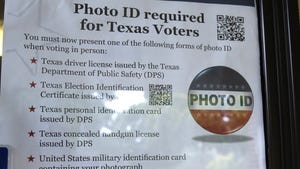
Pax On Both Houses: Compendium Of Voter Fraud And Voter Suppression Posts
***
"Let's Make Photo I.D.s Mandatory For U.S. Voters"
***
WASHINGTON — Democrats and civil rights groups hope the fight to restore a key provision of the Voting Rights Act will boost turnout among minority voters this year, particularly in the South.
"We're going to do some things to raise the profile of the Voting Rights Act and the fact that the Supreme Court gutted it,'' said Rep. Cedric Richmond, a Democrat from Louisiana. "You will see us be more active. We tried to do it in a very bipartisan manner ... But it just doesn't seem like that's going to go far enough soon enough, so it's going to be a fight. ''
Richmond is among those working to pass legislation that would revive a section of the 1965 Voting Rights Act that the Supreme Court threw out last year. The bill's supporters are making their case at press conferences, town halls and in newspapers — online and in print — to mobilize voters.
The issue will be the focus of several panels at the Congressional Black Caucus' annual legislative convention in Washington this week.
A coalition of civil rights and voting rights groups recently collected more than 500,000 online signatures for a petition calling on Congress to act. Coalition members said they tried to present the petition to House Speaker John Boehner, R-Ohio, last week but found his Capitol Hill office locked.
"They cannot punt this football forever,'' Rep. Linda Sánchez, D-Calif., chairwoman of the Hispanic Congressional Caucus Task Force on Civil Rights, said of Republicans. "Every day that Congress fails to act, voters are in danger.''
Advocates acknowledge the measure stands little chance of passing before the November midterm elections. The House returns next week, but the Senate will be out until after the elections.
The Voting Rights Amendment Act proposed by Reps. John Conyers, D-Mich., Jim Sensenbrenner, R-Wis., and Sen. Patrick Leahy, D-Vt., would resurrect the law's "pre-clearance" provision requiring some states with a history of voting discrimination to get federal approval before making any changes in their voting procedures.
Last year's court decision threw out the formula that had been used to determine which states were subject to pre-clearance, effectively nullifying the provision itself.
Under the proposed amendment, states with at least five voting rights violations in the past 15 years — one of the violations would have to be statewide — would be subject to pre-clearance. Georgia, Louisiana, Mississippi and Texas would be covered. Alabama, where the Supreme Court court case originated, would not be covered.
Opponents of the amendment, including Mississippi Secretary of State Delbert Hosemann and Louisiana Secretary of State Tom Schedler, argue that it's not necessary. Hosemann noted that federal officials are still free to challenge jurisdictions that violate the Voting Rights Act by attempting to disenfranchise minority voters.
"That's still in place, just as it was last year and the year before and the year before that,'' Hosemann said.
The amendment's supporters say pre-clearance is as necessary now as when the Voting Rights Act was first approved. They say new election laws passed by Republican-controlled state legislatures attempt to keep minorities from the polls.
One of those laws requires that voters in Mississippi show a photo ID before casting a ballot. Nov. 4 will mark its first test in a general election.
Predictions by the law's opponents that it would keep minority voters from casting ballots have proven "totally false," Hosemann said. He noted that 99.9% of people who voted in this year's primaries showed up with a photo ID.
"In Mississippi, this won't be a campaign issue because we live and work together,'' Hosemann said. "If that's going to be the main campaign argument in this upcoming election, it's not going to have any weight in Mississippi.''
Laura Murphy, director of the American Civil Liberties Union, said restrictive voting laws adopted by states in 2010 and 2012 helped spur minority-voter turnout.
"It's going to be incumbent upon civil rights leaders to make clear what's at stake," she said of this year's elections. "And if we are successful in doing our job, I think black and minority voters will turn out. We have to inform people that the tools we had to protect something as fundamental as their right to vote have evaporated.''
Earlier this summer, the Senate Judiciary Committee held a hearing on the legislation to resurrect the pre-clearance provision, but the House Judiciary Committee hasn't acted.
"The Senate's not the problem, it's the House,'' said Richmond of Louisiana. "I don't think any of the Republicans want to force their members to vote on a voting rights bill before these elections. They have a lot of vulnerable members that they don't want to have to take this tough vote."


No comments:
Post a Comment